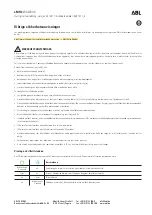
Towing can require a variety of
equipment, depending on the size of
your trailer, how it will be used, how
much load you are towing, and
where you tow.
Discuss your needs with your trailer
sales or rental agency, and follow the
guidelines in this section. Also make
sure that all equipment is properly
installed and maintained, and that it
meets federal, state, province, and
local regulations.
Any hitch used on your vehicle must
be properly bolted to the underbody.
Always use safety chains when you
tow a trailer. Make sure the chains
are secured to the trailer and hitch,
and that they cross under the tongue
and can catch the trailer if it
becomes unhitched. Leave enough
slack to allow the trailer to turn
corners easily, but do not let the
chains drag on the ground.
See your trailer dealer or rental
agency for more information on
installing electric brakes.
Trailer lights and equipment must
comply with federal, state, province,
and local regulations. Check the
requirements for the areas where
you plan to tow, and use only
equipment designed for your vehicle.
Since lighting and wiring vary by
trailer type and brand, you should
have a qualified technician install a
suitable connector between the
vehicle and the trailer. Improper
equipment or installation can cause
damage to your vehicle’s electrical
system and affect your vehicle
warranty.
Honda requires that any trailer with
a total weight of
1
,000 lbs (455 kg) or
more be equipped with its own
electric or surge-type brakes.
If you choose electric brakes, be
sure they are electronically actuated.
Do not attempt to tap into your
vehicle’s hydraulic system. No
matter how successful it may seem,
any attempt to attach trailer brakes
to your vehicle’s hydraulic system
will lower braking effectiveness and
create a potential hazard.
Towing Equipment and
Accessories
Hitches
Saf ety Chains
Trailer Brakes
Trailer Lights
Towing a Trailer
D
riv
ing
215
Main Menu
Table of Contents
s
t
Main Menu
s
t
Table of Contents
Содержание 2007 Accord Coupe
Страница 185: ......
















































